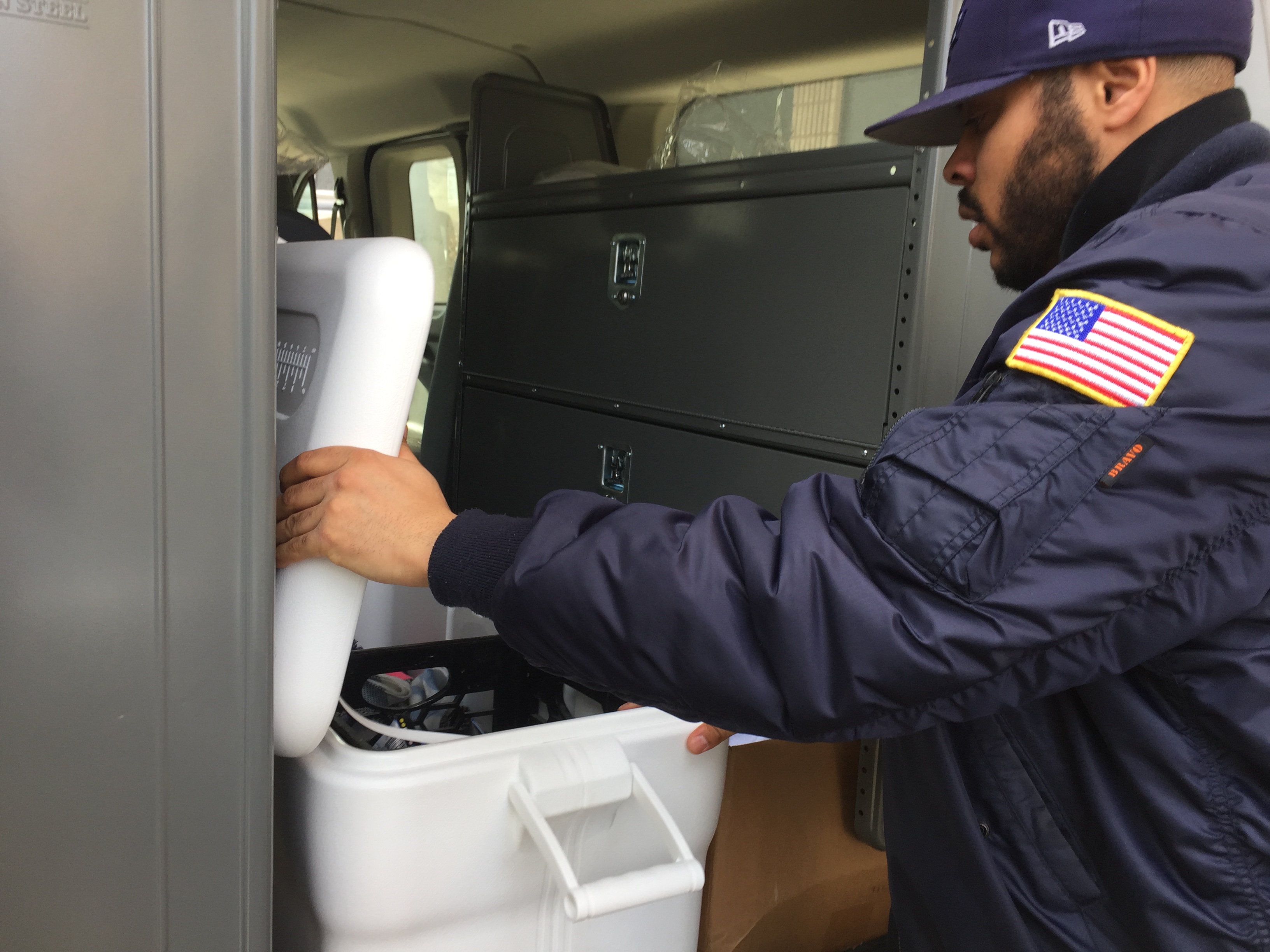Update: On Wednesday, Action Boston for Community Development (ABCD) announced their outreach van program has been extended to the end of April thanks to additional funding from the City of Malden. However, ABCD is still concerned the program will shut down after April 30th if they can’t secure ongoing funding.
Original story
On an unusually warm Tuesday afternoon in February, members of the mobile homeless outreach team pull their van up to the back of Parlin Memorial Library in Everett – a place they usually find their homeless clients hanging out.
Police officers start entering the library and the homeless outreach team asks if they are looking to remove a homeless person from the area, but it turns out to be a false alarm.
“There’s a guy in a wheelchair, but I don’t think he wants any help,” an officer says about a homeless man he had seen earlier. “He’s always causing problems.”
A few miles up the road is the homeless man that everyone is talking about: Larry. He’s in a parking lot of a Dunkin’ Donuts talking to a man named Tyrone. The outreach team engages with him and today he’s in a good mood, but refuses any services.
“He’s of the belief that we’re going to take his wheelchair and take his mobile transportation,” said outreach team specialist Aaron Blythe of Action Boston for Community Development (ABCD). “And last time we saw Tyrone I bought him a sandwich so he would go to detox. He didn’t go but he sure ate that sandwich.”
Larry and Tyrone are a few of the homeless people that the ABCD Mobile Homeless Outreach Team (MHOT) have been able to engage through their mobile van program in Medford, Malden and Everett.
The program is set to close this March as the Department of Housing and Urban Development (HUD) is refusing to provide the agency with its yearly funding of $164,000.
The MHOT provides homeless people on the streets with basic necessities, such as underwear, socks, t-shirts and toiletries, while linking them up to resources and referrals that can help with housing services, detox centers and shelters.
ABCD’s Housing Resource Coordinator Richard Matos-Haile lamented HUD’s decision not to award the program another grant despite progress being made.
“You never think that a new program wouldn’t be given a second renewal,” Matos-Haile said. “It needs to develop. It was just getting up and running … I don’t think that’s taken into consideration in the scoring scale.”
While HUD is not interested in funding the program for a third year, outreach specialist Aaron Blythe stressed its importance.
“We fell short when it came to their grading system,” Blythe said. “But for people who live on the opposite side of Everett to have to come to the office who are disabled, or who have trouble spending their money on a bus to get into the next town, it’s going to create another barrier for them to get the services they need to get off the streets … it’s kind of a domino effect, without having everything set in place it’s easier for things to fall apart.”
And getting information from clients isn’t an easy task, especially if they are used to being taken advantage of, Blythe said. And that type of data is what HUD is looking for in order to continue funding programs like MHOT.
“We try to keep good tabs on people. A lot of it is us chasing our clients,” Blythe said. “Often times it does take a lot of running after people … there’s gaps in the data they’re judging us on.”
While city officials and police officers have expressed sympathy for the lack of funding, very have stepped up to the plate financially to keep the program going.
ABCD President and CEO John Drew said he is trying to keep the van running for the next few months until they can get funding from state or city budgets in July, but lacks the funds necessary to make that happen.
“The truth is that we’ve got a very good program and not very expensive and does a lot of good stuff in the Malden/Everett/Medford area,” Drew said. “But bureaucracy the way it is HUD has certain criteria and the type of program has been on a little less than the top of the list the last couple of years.”
Drew argues that the value of this program is not lost on the communities who are dealing with a large homeless population.
“Everyone wants to help, but the immediate means are not readily available … that’s where we are and we will do the very best we can to keep this program going to see it back to a place where we can get more permanent funding.”
Despite some money from Malden Mayor Gary Christenson, Drew said there still isn’t enough for resources that the van needs in order to operate.
“It’s not a gimmick, it’s actually something that really works,” Drew said of the MHOT van. “People think of it as something that has the ability to maybe stabilize a little bit … but once you pull it out I think people obviously saw the loss.”
Blythe, who is worried about the rise in 911 calls as a result of the MHOT not being out on the streets to help handle situations with some of their homeless clients, fears that those who need the most help might not be able to get it in a timely manner.
“The actual human element of it is much more than what shows up on paper,” he said. “We are able to make a type of difference in their life in a matter of months and without this program this change will happen more slowly.”
Please note the print version of this article doesn’t include the update about the extension. Our newspaper went to print before receiving the news.

Leave a Reply
You must be logged in to post a comment.